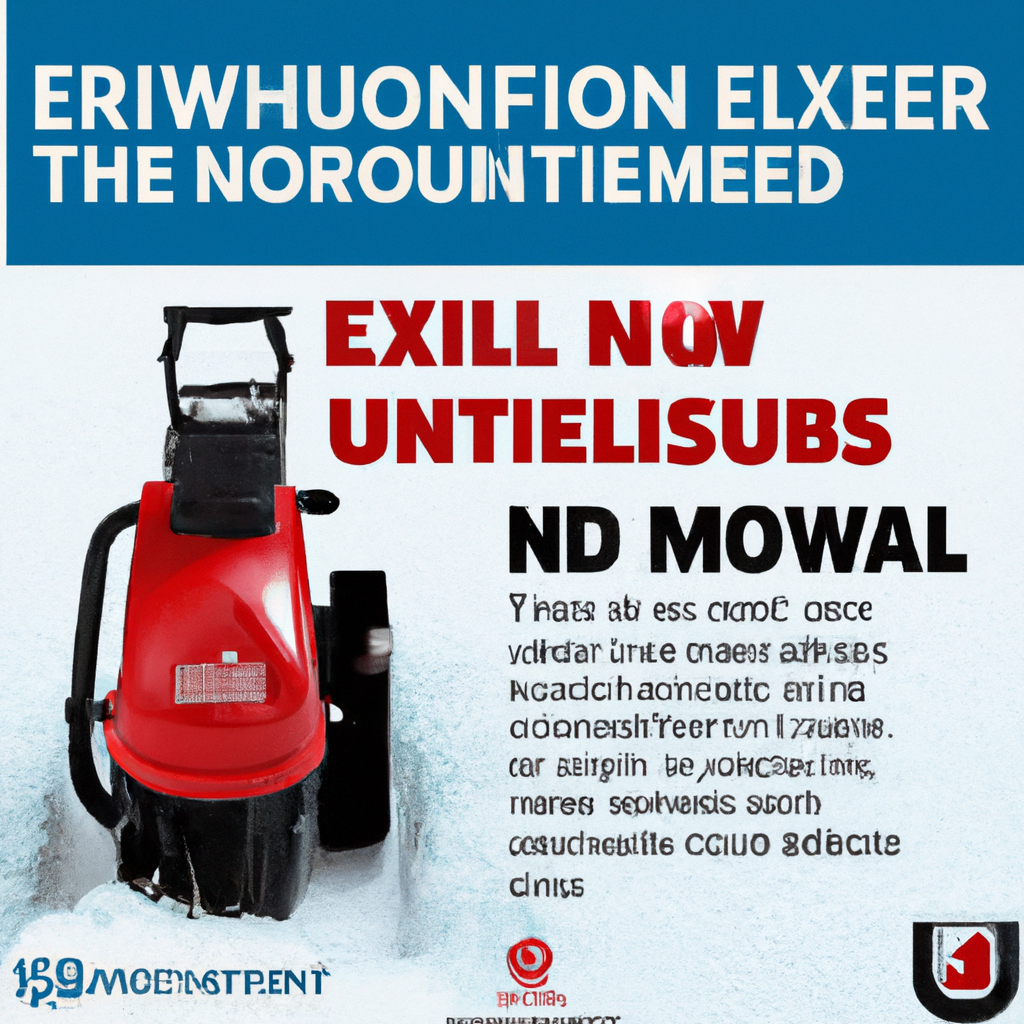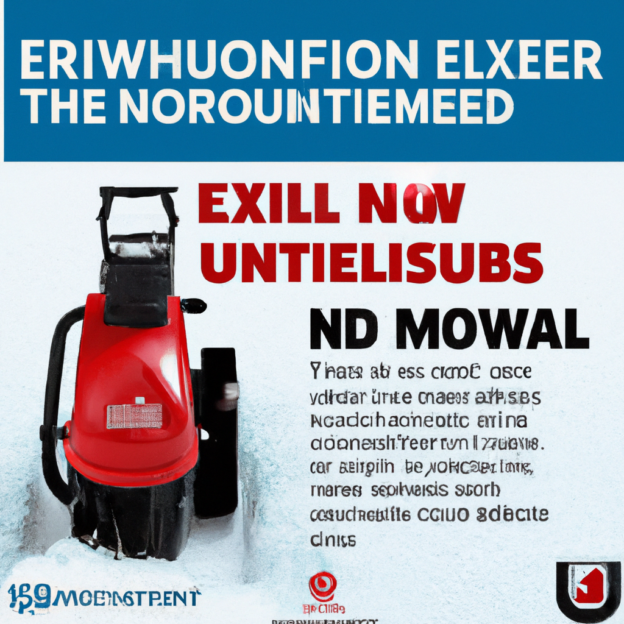If you own a snowblower and you’re tired of dealing with the headaches that come with using ethanol fuel, then it’s time to consider making the switch to non-ethanol fuel. Not only will this save you from the frustrating issues commonly associated with ethanol, but it can also provide several benefits to your snowblower’s performance. From improved fuel efficiency and reduced engine deposits to easier starting and extended engine life, non-ethanol fuel is a game-changer for those who want a hassle-free snow clearing experience. So, let’s explore the advantages of using non-ethanol fuel in your snowblower and how it can make your winter maintenance tasks a breeze.

Increased Performance
Using non-ethanol fuel in your snowblower can greatly improve its performance. One of the ways it does this is through cleaner fuel combustion. Non-ethanol fuel burns more efficiently and produces fewer byproducts, resulting in a cleaner and smoother combustion process. This leads to improved power output, as the fuel is able to generate more energy and efficiently transfer it to the engine. Additionally, non-ethanol fuel can reduce engine wear, as it doesn’t contain the corrosive properties of ethanol that can damage engine components over time.
Better Fuel Efficiency
If you’re looking to get more mileage out of your snowblower, non-ethanol fuel is the way to go. Using this type of fuel can increase your snowblower’s mileage, allowing you to clear more snow without constantly refueling. This is because non-ethanol fuel has a higher energy content and burns more efficiently, resulting in reduced fuel consumption. Ultimately, this can save you money and time, as you won’t have to make as many trips to the gas station or refill your snowblower’s tank as frequently.
Overall Engine Health
Opting for non-ethanol fuel can contribute to the overall health and longevity of your snowblower’s engine. By using this fuel, you can prevent fuel system issues that may arise from the use of ethanol. Unlike ethanol, non-ethanol fuel does not attract water, preventing the formation of moisture-related problems such as fuel contamination and engine damage. Moreover, non-ethanol fuel helps to minimize carbon deposits, which can negatively affect engine performance and efficiency over time. This means your snowblower’s engine can stay in better condition, requiring less maintenance and repairs.

Easier Maintenance
Choosing non-ethanol fuel can make your snowblower’s maintenance a breeze. With this type of fuel, you can expect fewer repairs and a reduced need for fuel system cleaning. Since non-ethanol fuel doesn’t contain the corrosive properties of ethanol, it helps to keep the fuel system components clean and free from damage. This saves you both time and money that would otherwise be spent on repairing or replacing parts of your snowblower’s fuel system. By using non-ethanol fuel, you can enjoy a hassle-free maintenance experience.
Environmental Benefits
By using non-ethanol fuel in your snowblower, you can contribute to a cleaner environment. Non-ethanol fuel has been found to produce lower emissions compared to ethanol-blended fuels. This means that by using non-ethanol fuel, you’re helping to reduce air pollution and contribute to better air quality. These fuel emissions have a direct impact on our planet’s health, so choosing non-ethanol fuel for your snowblower is not just beneficial for your equipment but also for the environment as a whole.
Prevents Ethanol-Related Problems
One of the most significant benefits of using non-ethanol fuel in your snowblower is its ability to prevent ethanol-related problems. Ethanol-blended fuels can lead to fuel breakdown, which can result in poor engine performance and inefficiency. Additionally, the corrosive nature of ethanol can cause engine damage over time, leading to costly repairs or even engine failure. By using non-ethanol fuel, you can eliminate these risks and ensure that your snowblower runs smoothly and efficiently, without the negative effects of ethanol.
Reduced Risk of Fuel Contamination
Using non-ethanol fuel can help reduce the risk of fuel contamination in your snowblower. Ethanol has a tendency to absorb water, which can lead to the formation of moisture in the fuel system. This can cause fuel system components to rust or corrode, leading to potential performance issues and damage. Non-ethanol fuel doesn’t have this water-absorbing property, ensuring that your fuel remains clean and free from contamination. By eliminating the risk of fuel contamination, you can ensure that your snowblower operates reliably and efficiently.
Longer Shelf Life
Another advantage of non-ethanol fuel is that it has a longer shelf life compared to ethanol-blended fuels. Ethanol tends to absorb moisture from the atmosphere, causing the fuel to break down and degrade over time. This can lead to fuel instability and poor engine performance when using ethanol-blended fuels that have been stored for an extended period. In contrast, non-ethanol fuel has a more stable composition, allowing it to maintain its quality and performance characteristics for a longer period. This means that if you need to store your snowblower for an extended period, non-ethanol fuel is a reliable choice that will be ready to use when you need it.
Compatibility with Older Snowblowers
If you own an older snowblower with a carbureted engine, non-ethanol fuel is particularly beneficial. Carbureted engines are more susceptible to the negative effects of ethanol, as ethanol tends to attract moisture and cause fuel system problems. By using non-ethanol fuel, you can avoid the ethanol-induced issues that can arise in carbureted engines, such as clogged jets or gummed-up carburetors. This ensures that your older snowblower can continue to operate smoothly and reliably, without the complications that ethanol-blended fuels can present.
Availability and Accessibility
One of the great things about non-ethanol fuel is its widespread availability and easy accessibility. While some specialty fuels may be harder to find or require special ordering, non-ethanol fuel can be readily found at many gas stations and fueling stations. This means that when you need to refuel your snowblower, you won’t have to go out of your way or spend time searching for a particular type of fuel. The convenience and accessibility of non-ethanol fuel make it a practical and hassle-free choice for snowblower owners.
In conclusion, using non-ethanol fuel in your snowblower offers a range of benefits. From increased performance and improved fuel efficiency to enhanced engine health and easier maintenance, non-ethanol fuel proves itself to be a superior choice. Moreover, the environmental benefits, prevention of ethanol-related problems, reduced risk of fuel contamination, longer shelf life, compatibility with older snowblowers, and widespread availability and accessibility make non-ethanol fuel a reliable and practical option for snowblower owners. By opting for non-ethanol fuel, you can ensure that your snowblower operates at its best, saving you time, money, and frustration in the long run.
